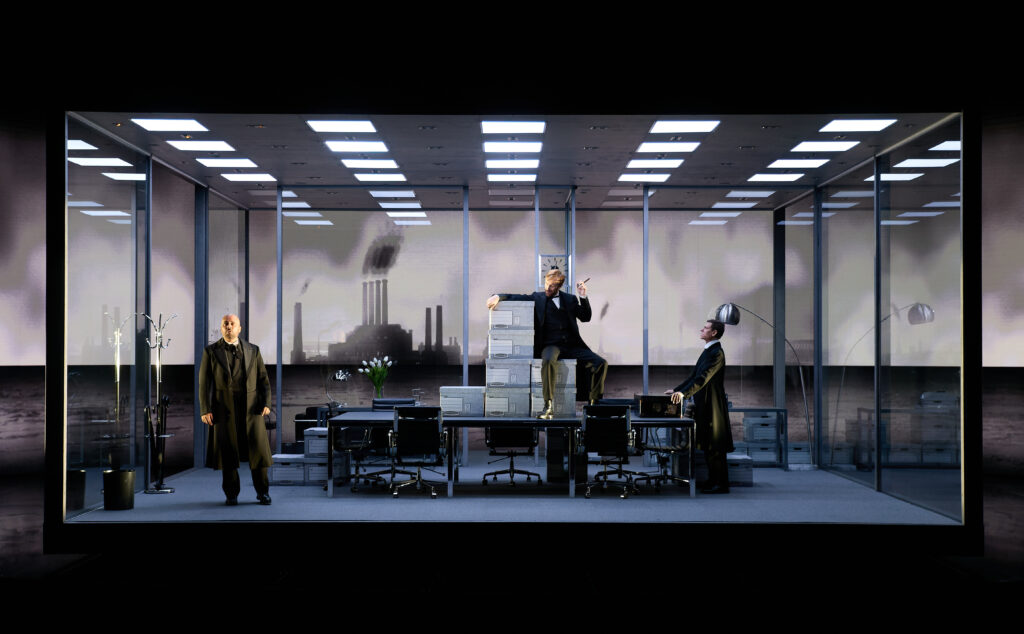
Review by Katie Shaw
Stefano Massini’s The Lehman Trilogy is back in London’s West End for a third time since its initial run at the National Theatre in 2018. It is clear to see why this 5x Tony Award-winning play has garnered such international acclaim, for the writing, tone, pace, and direction are nothing short of exceptional. Fast paced, engaging, hilarious, and earnest, this play is not one to be missed.
Covering 164 years of American history, spanning three generations, and witnessing immeasurable change to the economic and industrial landscape of the United States, The Lehman Trilogy is a tale of three Bavarian brothers who come to America in 1844 in search of something greater: The American Dream (in its very prime). Standing on a glass box set, housed with a boardroom, office space, and a seemingly infinite supply of cardboard boxes, Leighton Pugh introduces us to his character, Henry ‘Hayum’ Lehman.

Emigrating to the U.S. in 1844, Lehman quickly made a name for himself in Montgomery, Alabama. With the arrival of his two younger brothers Emmanuel and Mayer a couple of years later, the three establish themselves as The Lehman Brothers, starting out as a fabric company. The shifting economic landscape sees the brothers quickly seeking their fortune in the Confederate South’s largest export: cotton. The fall of the Confederate South after the Civil War meant the tide changed once again, and the brothers adapted, cementing their fortune in a banking business. As the generations moved and adapted, so did the business, and by 1929, the investment company The Lehman Corporation, which ran until 2008, was established.
Not only did the brothers and the Lehman family cement themselves as businessmen over time, but also as true Americans. In 1855 when Henry Lehman died, the brothers mourned in true German-Jewish fashion: ripping their clothes, closing the business for 7 days, and allowing themselves space to grieve. In 1947 when Philip Lehman dies, the family acknowledge that they cannot mourn in such a way, for it would hurt the business and therefore their financial status. Their idea? To close for three minutes. It is a nod to those who paved the way for us – The Lehman Brothers business was built on the very foundations of family and immigration, but in its contemporary form it became driven by capitalism and a need to survive in the fast-paced, ruthless world that is New York’s financial district.

The storytelling is fast-paced, intense, and captivating, made all the more so by the immense talent of Pugh as Henry, Howard W. Overshown as Emmanuel, and Aaron Khron as Mayer. Morphing into other characters – namely the brothers’ sons, daughters, nephews, nieces, and grandchildren – was executed with ease and hilarity by this trio and highlighted the natural charisma and conviction of the actors. Pugh had stepped up as understudy in place of the indisposed John Heffernan to play Henry Lehman, but this trio’s chemistry was natural and undeniable, unphased by this last-minute cast shake-up. Khron commanded the audience as Bobby Lehman in his old age, dancing on top of the boardroom table until his end, showcasing his rigour for business and for life.
The story was woven beautifully with historical allusion, charm, ease, and hilarity. Cat Beveridge on the piano and Luke Halls’ visuals on the screen behind the set were two excellent contributors to the story, with Beveridge’s melodies and Halls’ visuals lending themselves to each of the three acts of the play, providing important historical context as well as emotional and evocative sentiment. Addressing themes like immigration, slavery, debt, death, family ties and religion made for a play that we can all resonate with, but Massini and Ben Power peppering it with laugh-out-loud moments and witty one-liners provided some well-needed comic relief.
A phenomenal play built from an awe-inspiring tale of the Lehman brothers, The Lehman Trilogy is a must-watch.
Rating: ★★★★★ (Excellent)
The Lehman Trilogy is at the Gillian Lynne Theatre until 5 January 2025
Read our review of The Lehman Trilogy’s previous West End run here:














